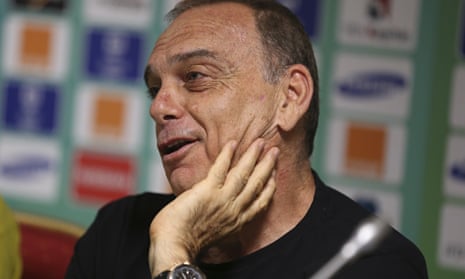As the helicopter descended, Avram Grant glanced up, his face as cadaverous as ever, but seemed emotionless. Whatever he actually felt amid the violence that led to Ghana’s Cup of Nations semi-final against Equatorial Guinea being suspended for almost 40 minutes, his outward appearance was calm. When the smoke grenades cleared, fans were evacuated from two stands of the Estadio de Malabo and the bottles and other missiles were cleared from the pitch, the overriding sense was of the sang-froid with which Ghana had reacted.
This is a team that has, with some justification, been accused of complacency in the past two Cups of Nations. Here, the lack of outward emotion was a positive. “We had a very good training camp in Spain,” said Grant. “We did a lot about mentality – it’s important in sports and in life to recover. This is one of the things I wanted to see with the team: the mentality. I think this is one of the keys for everything. It’s important also in life to look for solutions when things are going wrong. [The semi-final] showed a lot of strength in very difficult situation; the players showed to people in the country that they can count on them.”
Images of the violence will inevitably overshadow the tournament, for all the extraordinary work that Equatorial Guinea had done in putting the tournament on. The police actually did a remarkably good job of protecting the Ghanaian fans, shepherding them from the stadium before ferrying them away on buses, but the impression was that they were significantly under-resourced and under-prepared – riot police who seemed never to have seen a riot – before finally over-reacting by flying a helicopter low over the heads of home fans and firing smoke grenades to disperse them.
The Confederation of African Football fined the hosts’ federation $100,000, ordered them to pay medical costs of the Ghanaian fans and has given them a one-match suspended ban (an intriguing contrast to the six-month ban given to the referee Rajindraparsad Seechurn for giving a controversial late penalty). The ruling Democratic Party of Equatorial Guinea blamed “the eternal enemies of peace” and called on the public “to reaffirm their ideals of peace and to express peacefully their most energetic condemnation and rejection of these intolerable acts of inciting violence and disorder in our country.”
The shift in the perception of Grant over the course of this tournament has been remarkable. When Ghana lost their opening game, well beaten by Senegal, Grant sat awkwardly in the post-match press conference, fending off furious questions about his late switch to a back three while a bat fluttered disconcertingly overhead.
During a semi-final win over the hosts, in which Ghana, while perhaps never quite hitting the heights of fluency, demonstrated a pragmatism and adaptability that had been beyond Gabon in the final group game and Tunisia in the quarter-final, he seemed to take the lead in facing down 15,000 home fans intent on pelting him and his players with water bottles and then other missiles including stones, plates and mirrors. “I didn’t know what was happening,” said Grant. “We saw some incidents of violence. I couldn’t say I wasn’t concerned but I wanted to keep the safety of my players.”
Grant, whose time at Chelsea is perhaps better remembered in Ghana than his stints at Portsmouth and West Ham, both of which ended in relegation, has become a national hero; the blue polo shirt he adopted for the second group match, when Asamoah Gyan’s late goal secured a vital win over Algeria, venerated as an icon. “After I wore it in the second game, everybody wanted me to continue to wear the shirt,” he said. “We won [the semi-final] because of the shirt, not because we scored three goals.”
In the final, though, Grant’s lucky top will come up against one with a far greater track record: Hervé Renard’s legendary white shirt. Since he wore navy blue when managing Zambia against Cameroon in a group game in 2010, Renard has gone 16 games unbeaten in white, a run that included Zambia’s improbable Cup of Nations triumph in 2012. If he can bring Ivory Coast’s 23-year wait for a second Cup of Nations to an end, he would become the first manager to win with two countries.
Of more material significance, perhaps, are the doubts around the forwardGyan, who has been having three massages a day on his pelvis, which he injured in the quarter-final. He is expected to be fit which, given how the Ivorian back three struggled against the physicality of Dieumerci Mbokani, could be significant.
Grant may be derided in England, but he and his lucky shirt are one game from taking Ghana to their first Cup of Nations in 33 years.

Comments (…)
Sign in or create your Guardian account to join the discussion